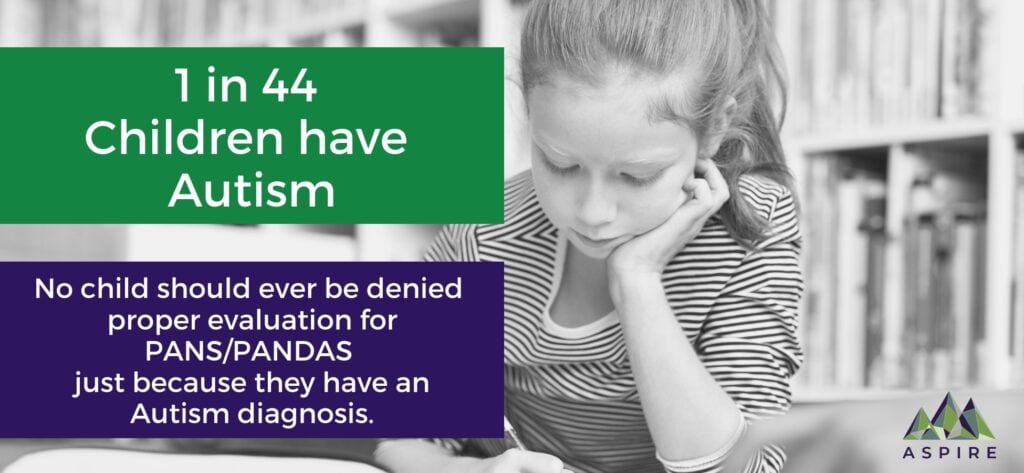ASPIRE’S Professional Advisory Board publishes PANS/PANDAS Guidelines for Children with Autism
PANS PANDAS & Autism
Children who have autism spectrum disorder (ASD or autism) are at risk for the same medical conditions as children without autism. Therefore, they are susceptible to developing Pediatric Acute-onset Neuropsychiatric Syndrome (PANS) and Pediatric Autoimmune Neuropsychiatric Disorder Associated with Streptococcal infections (PANDAS). However, diagnosing PANS and PANDAS can be more challenging in children who have autism because of the overlapping clinical presentations. For example, ritualized, repetitive behaviors are common to both disorders, so to make a diagnosis of PANS or PANDAS in a child with ASD, there must be an abrupt and discernable change in behavior such as new rituals, restricted food or fluid intake, excessive irritability or a worried/anxious appearance.
No one should be denied a proper evaluation of PANS PANDAS. Members of the ASPIRE Professional Advisory Board have written PANS/PANDAS Guidelines for Children with Autism because too often, the medical conditions of children with Autism are overlooked and dismissed as “just the autism,” but children with Autism are at risk for the same medical conditions as children without Autism, including PANS PANDAS. This informational toolkit discusses the unique challenges of diagnosing PANS PANDAS in children with Autism, what it can look like in the school setting, the PANS diagnostic criteria, and treatment guidelines.
Please share this information; let’s work on properly diagnosing and treating children, so we do not consign them to a lifetime of mental health issues.
When to Evaluate Your Child with Autism for PANS
- If a child has sudden regressive Autism, they should be evaluated for PANS/PANDAS.
- If a child has sudden worsening of symptoms associated with Autism, they should be evaluated for PANS/PANDAS.
- If a child with Autism has new behaviors or symptoms that correspond to the PANS/PANDAS diagnostic criteria, they should be evaluated for PANS/PANDAS.
Important to note: Because of the sudden change in behavior, children with and without autism are often referred for psychiatric care without consideration of PANS/PANDAS. As a result, these children may be misdiagnosed and/or receive the wrong treatment.
 To Download: Click the button below to download the eight-page information packet – ASPIRE PAB PANS/PANDAS Guidelines for Children with Autism. Register with ASPIRE to download this information packet.
To Download: Click the button below to download the eight-page information packet – ASPIRE PAB PANS/PANDAS Guidelines for Children with Autism. Register with ASPIRE to download this information packet.
To Email or Share this Page Via Social Media: Copy and paste the link or use one of the buttons on the side (desktop) or bottom (mobile) of each page of the website.
Quick Facts about Autism and PANS PANDAS
- 1 in 44 children are estimated to have been diagnosed with Autism.
- 1 in 200 children are estimated to have PANS/PANDAS. Please note, this is a very rough estimate and true prevalence numbers are unknown.
- One can have a dual diagnosis of PANS/PANDAS and Autism.
- One can be misdiagnosed with Autism but actually have PANS/PANDAS.
- In ASD, boys were more than 4 times as likely to be identified than girls.
- In PANS/PANDAS, boys outnumber girls approximately 2 to 1.
- No child should ever be denied proper evaluation for PANS/PANDAS just because they have Autism or another diagnosis.
- If a child has sudden regressive Autism, they should be evaluated for PANS/PANDAS.
- If a child has sudden worsening of symptoms associated with Autism, they should be evaluated for PANS/PANDAS.
- If a child with Autism has new behaviors or symptoms that correspond to the PANS/PANDAS diagnostic criteria, they should be evaluated for PANS/PANDAS.
- A child with Autism can have OCD without having PANS/PANDAS.
ASPIRE Professional Advisory Board Contributing Authors:
- Susan Swedo, MD – Scientist Emerita National Institute of Mental Health
- Nancy H. O’Hara, MD, MPH, FAAP- Integrative Pediatrics, New England Center of Health
- Sydney Rice, MD, Msc – Developmental Pediatrics, Co-Director Childhood Autoimmune Encephalopathy Clinic, University of Arizona
- Anu French, MD, FAAP, ABoIM – Integrative Pediatrician SSM Health Cardinal Glennon Pediatrics
- Fern Aaron Zagor, LCSW, ACSW – Principal Consultant, Fern Zagor, LLC
Click for more information about the ASPIRE Professional Advisory Board.
Also, see:
Return to Section:

5 comments to Toolkit – PANS/PANDAS Guidelines for Children with Autism
Jessica Touhey
May 7, 2024Hi! I’m trying to find out more information about pans/pandas and treatments and who could help my child.
Gabriella True
May 7, 2024Hi,
Please read the website section on Treating PANS https://aspire.care/treating-pans/treating-pans-pandas/. You can email us at our help desk for suggested providers. Contact ASPIRE. https://aspire.care/contact/
Pediatric Care
January 3, 2025Understanding the link between PANS/PANDAS and autism is essential for providing the best care. The guidelines you’ve outlined offer valuable insights for clinicians and parents, helping to improve the approach to treatment. Great resource for anyone working with children with autism.
Lorie
April 8, 2025Can PANS or PANDAS be passed down genetically from a parent?
Gabriella True
April 27, 2025Hi Lorie,
There is work identifying a cluster of genes. It is not a single gene. We know that 70% of patients have a family history of strep-related and/or autoimmune related illness.